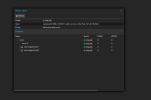So for the past couple weeks i have been looking into using full disk encryption on all my hosts.
I literally went through all sorts of different setups (got like 20 test VMs by now) and guides...
What i am still not sure about is the way for the final proxmox setup,
is it better to
Option 1: just live boot debian do all the storage setup there and then install proxmox as an application on that debian or
Option 2: first install proxmox on that server normally via the proxmox iso (just as simple zfs raid1) on two other temporary disks,
then use the debian live boot to just setup the luks, boot and efi sections on the real disks and
after that finally just move the proxmox partitions from the temporary disks (via zfs export / import) on top of the luks mapped devices?
(btw the installation on the temp drives is done on the actual server thats later going to run that proxmox install to make sure all the devices & stuff like network configs is set correctly for that particular host)
I am currently leaning more to option 2 but wanted to ask what your opinion on that is.
What i figured out during testing so far
The base setup that is identical for both options (debian live boot, creating the partitions & luks setup) is quite straight forward and doesnt cause any major headaches.
Where the issues with option 1 started was the debian installation from the live boot on the disks just created disks. Numerous errors during install and while the system booted from the disks mostly fine, the entire debian install was completely weird, a lot of different settings where just very different from even a normal debian install via the guided setup, i also pretty bad stability issues on that install. (i dont know how i messed up )
)
Also since proxmox does change quite a lot of things when installed via the official proxmox iso compared to a installation thats done manually on top of debian i would prefer to have everything like when installed via the official iso.
So yeah do you think it is a good idea to just move the zfs volumes from a proxmox iso install on top the luks volumes?
I literally went through all sorts of different setups (got like 20 test VMs by now) and guides...
What i am still not sure about is the way for the final proxmox setup,
is it better to
Option 1: just live boot debian do all the storage setup there and then install proxmox as an application on that debian or
Option 2: first install proxmox on that server normally via the proxmox iso (just as simple zfs raid1) on two other temporary disks,
then use the debian live boot to just setup the luks, boot and efi sections on the real disks and
after that finally just move the proxmox partitions from the temporary disks (via zfs export / import) on top of the luks mapped devices?
(btw the installation on the temp drives is done on the actual server thats later going to run that proxmox install to make sure all the devices & stuff like network configs is set correctly for that particular host)
I am currently leaning more to option 2 but wanted to ask what your opinion on that is.
What i figured out during testing so far
The base setup that is identical for both options (debian live boot, creating the partitions & luks setup) is quite straight forward and doesnt cause any major headaches.
Where the issues with option 1 started was the debian installation from the live boot on the disks just created disks. Numerous errors during install and while the system booted from the disks mostly fine, the entire debian install was completely weird, a lot of different settings where just very different from even a normal debian install via the guided setup, i also pretty bad stability issues on that install. (i dont know how i messed up
Also since proxmox does change quite a lot of things when installed via the official proxmox iso compared to a installation thats done manually on top of debian i would prefer to have everything like when installed via the official iso.
So yeah do you think it is a good idea to just move the zfs volumes from a proxmox iso install on top the luks volumes?


